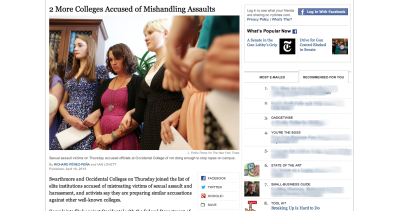Year in Review: The Disappointing Appeal Process (pt.1)–Background
[As this year wraps up, I thought it would be worth talking about some of the good things and bad things I’ve noticed that cut across all systems.]
All college discipline systems have an appeals process that is meant to protect the rights of the respondents. In theory, these are the checks on the authority of the judicial boards that can suspend or expel a student. Since the judicial boards have so much power, the appeals process is meant to ensure that a student was not sanctioned unfairly or against policy. If you’re a student or a Greek organization and you go through the judicial process (“respondent”) and get a sanction you think is unfair or you feel you were denied a fair hearing, you can appeal that decision to a “higher” administrator authority. The idea behind this is a good one—while the boards are very well trained and successfully make dozens of hard decision each year, occasionally there might be a mistake that unjustly impacts a respondent. The appeals process makes sure that these mistakes are corrected and that the “right” result is ensured.
Unfortunately, in most systems the appeals process is merely a false hope offered to respondents, and their actual chance of changing a board’s decision is nil.

Almost without exception, the appeal is not a rehearing of the case. Since the board heard the case and was in the best position to make decisions of fact, the de facto position is that their conclusions are “true” unless some “mistake” happened to make their conclusions incorrect. As a rule of thumb, even though a judicial board uses the “preponderance of evidence” standard when deciding facts, a higher standard is used when deciding if those facts are reasonable. (More on that later.) Even more importantly, almost no system allows you to directly attack the board’s findings so you must use a different ground to get to a place where your dispute will be considered-something beyond the ability of almost all students. There are only a few grounds a respondent can use in an appeal (and most schools have some combination of these, although they may be worded differently):
- New evidence that was not available during the hearing, but which could/would have changed the outcome—This is an almost impossible standard. It does not mean that there was something a respondent could have presented but chose not to and it does not mean that there was something that they could have found but didn’t. It means literally that something came to light after the hearing that would have been used if it was found before the hearing, and that it was not discoverable prior. (Some systems have a looser interpretation, but this is the common one.) Not only that, but it needs to be different from the other evidence that was presented in order to potentially have changed the outcome.
- A procedural error which affected the outcome—This is a two part check. It is not enough that a procedural mistake was made, but that mistake needs to be serious enough that it resulted in a decision that would have been different if it was not made. Since a judicial administrator’s job is to make certain that these types of errors do not occur, these are rarely winners. (This ground is usually a way to argue the facts, but the appeals officer has to agree that there was a violation or she will just dismiss the argument without consideration.)
- A misinterpretation or incorrect use of policy—This is less commonly used, but it essentially means that there was a charge that, when applying the facts as the board found them, should not have resulted in responsibility.
- The sanction is too severe for the violations—This is where most students couch their appeal because to them this one is both true and understandable. A respondent may not understand what the policy for dis
 puting the impartiality of a board member is and whether or not there was a mistake, but she knows that being suspended for a year is severe. The mistake they make is that in order to win on this ground, the sanction given has to be more severe than the acceptable range for these violations. This does not mean that the appeals officer thinks that the sanction should havebeen lighter, but that the sanction given was not within an acceptable range of potential sanctions. Since most violations that could result in a suspension for a semester could, in theory, result in expulsion this is deceptively difficult.
puting the impartiality of a board member is and whether or not there was a mistake, but she knows that being suspended for a year is severe. The mistake they make is that in order to win on this ground, the sanction given has to be more severe than the acceptable range for these violations. This does not mean that the appeals officer thinks that the sanction should havebeen lighter, but that the sanction given was not within an acceptable range of potential sanctions. Since most violations that could result in a suspension for a semester could, in theory, result in expulsion this is deceptively difficult.
The problem is not the difficulty of an appeal, but that the system is set up to make it virtually impossible to make a successful argument. On Friday I will discuss why the appeals process is essentially “fixed” to work against the respondent, and next week I will offer some suggestions on how to make it fairer.
Am I missing something significant? Please feel free to comment and correct me, but if you are a judicial officer I ask that you include your appeals statistics for cases that resulted in suspension or expulsion.




